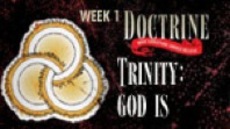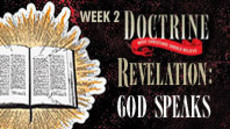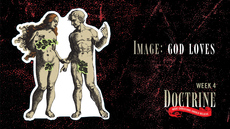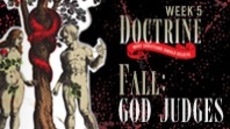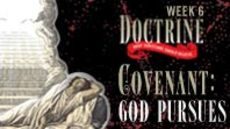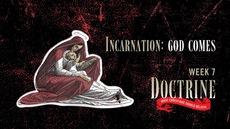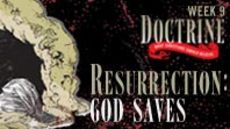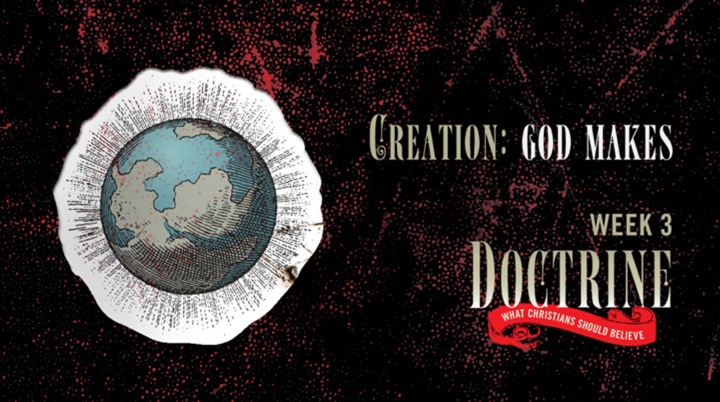
Can’t see the video? Download and install Flash to be able to view. Get Flash Here
“In the beginning, God created the heavens and the earth”. That’s the opening line of Genesis. But how old is the earth? Where did everything come from? And are we all just evolved beings from a totally different species? The doctrine of creation is a big topic for debate among Christians and non-Christians alike. Pastor Mark Driscoll teaches on it in the third week of our sermon series, Doctrine. Click here for additional notes.
You are listening to Doctrine, a sermon series where Pastor Mark Driscoll covers the basic beliefs of Christianity. This series also serves as a prerequisite for membership at Mars Hill Church. For more audio and video content, visit MarsHillChurch.org.
Well, howdy, Mars Hill. Good to see you all. My name is Mark if you’re new. I’m one of the pastors here at the church and today I’m in the third of thirteen weeks on a series called Doctrine. Today we’re gonna deal with the issue of creation and how God created and made the heavens and the earth. This could be about a 25 hour sermon. I’ll try to reduce it down from that. So I’ll go ahead and pray and we will get right to work. I’m gonna ask you to pay close attention. We’re gonna move through a tremendous amount of material together today. And I’m really enjoying my studies and hopefully it translates into some teachable concepts for you.
Father, I thank you that you have made the earth. I thank you, Lord God, that this earth is a gift for us to enjoy and to steward. I thank you for the water that we drink, the air that we breathe, the ground that we walk on. I thank you, Lord God, that in every way you have provided for our existence, our sustenance. And God, today as we examine the truth that you are the maker of heaven and earth, God, we ask that your Word would make sense to our hearts and our minds, that your Spirit would enable us to understand, to as much a degree as we are capable as finite and fallen people, the majesty of your creative work. And so we ask for this grace in Jesus’ good name. Amen.
Well, today we deal with the issue of creation and how the world that we enjoy, the air we breathe, the food we eat, the pets we love, the recreation we participate in is all given us as a gift from God. And we’ll start in our examination of the doctrine of creation with the first question, which is what does the Bible say about creation? The first thing I’ll say about the Bible is that it is a theological history more than a scientific textbook. This does not mean that the Bible doesn’t include some things that are scientific, but that’s not its primary focus, as you’ll see in just a minute.
The Bible opens up with this statement: “In the beginning God” – and so it is a book about God and about his work in history. And I think Galileo said it well. He said, “The Bible exists not to tell us as much how the heavens go, but rather to tell us how to go to heaven,” and I think Galileo, to some degree, was right. It is not – the Bible is not a comprehensive scientific textbook that tells us everything that science would raise as questions regarding creation. But it does tell us about the who and the what – that God made the heavens and the earth.
And we’ll just start right in. Here’s what the Bible says in Genesis 1. Elsewhere in Scripture you’ll find that Jesus is also involved in creation. John 1 says that everything that was made was made through him. Colossians 1 says that he is the image of the Creator, God, and that he himself, Jesus Christ, is the creator of all things. Here in Genesis 1 you’ll also see God – God the Father and the Holy Spirit – so the whole Trinity is involved in creation by the total testimony of Scripture.
But here is the first line of your Bible. “In the beginning God” – the Bible is about God. History is about God. Life is about God. We’re now three weeks into my series and we haven’t even really gotten into humanity yet. We won’t get there until next week. The Bible doesn’t start, “And God created you, and you’re the most important thing in all the universe.” The Bible starts that God is and God makes. And then God makes us and we find ourselves in relationship with God. Apart from that we don’t understand ourselves. So first, knowing God is primary importance, and then we’re able to understand our relationship with God.
So, “In the beginning,” which is reshit, it’s a Hebrew term and it means an indefinite period of time. So over an indefinite period of time God – the God of the Bible – created – so he’s the Creator. And the word there is bara in Hebrew. Not gonna claim to be a great Hebrew scholar, but this is what it said. Now, these words are very important because bara means to create from nothing. It’s the original creation. And then asah is to create in terms of preparing for human life. The point here is that God made everything, and then he prepared it for human life.
I’ll explain this a little more thoroughly. “In the beginning” – at some point in time – “God created” – from nothing – “the heavens and the earth.” And that is a merism. That means everything. That’s like saying from top to bottom, from beginning to end, from head to toe. “God created the heavens” – that’s everything above – “and the earth” – that’s everything below the heavens.
Chapter 1, verse 2 of Genesis then declares, “The earth was without form and void.” That language is used in other parts of the Old Testament to refer to uninhabitable wilderness. Greek cosmology – ancient Green cosmology with the philosophers said that basically the earth was originally a hunk of mud that evolved over time. Unfortunately some of the earliest English translation, all the way back to William Tyndale, took that ideology from Green cosmology, and I don’t believe that’s what it means. I believe in Hebrew “without form and void” means “uninhabitable.” Think wilderness. Think desert landscape. Think a condition in which human life is not necessarily sustainable and viable just yet. God created everything and the earth was not yet ready for human life.
“And darkness was over the face of the deep” – you can either take that that the sun had not yet been created. I tend to think that this indicates that God began his work at night. “And the Spirit of God” – the Holy Spirit – “was hovering over the face of the waters,” bringing order out of chaos and participating in creation and preparation of what God had made for human life.
That’s what the Bible tells us about our origins, that God eternally exists and at some point in time he created the heavens and the earth, all that is, and the land was not yet ready for human life that he was going to make. And so then God took the ensuing days – Genesis 1 reveals in its remaining verses, all the way up to chapter 2, verse 3, that God then prepared the land for human life. That’s what the Bible says about the beginning of creation.
Now that being said, next question is, “What are the various Christian views of creation?” You may have heard. People disagree on what I’m talking about today. There are lots of opinions and perspectives. And for those who are Christian and do believe the Bible and do believe that in the beginning God created the heavens and the earth there are at least six different ways that they interpret Genesis 1.
The first we’ll call historic creationism, and they teach that the earth is very old, or older than human life, and that the earth was created at some point in eternity past. And then over the course of six days God prepared the earth for human life. And then as we’ll see next week he created the man and the woman. And then the result is they teach that the six days in creation are literal, and then they teach that the earth is old and that humanity is young. That’s historical creationism, traced all the way back to a man named Augustine.
The second position is young earth creationism, and that is that God made everything in six days, including the heavens and the earth. That the earth didn’t exist for an indefinite period of time before God made the man and the woman and put them on the earth, that God created everything in six literal days. Therefore, the earth is very young and human life is also very young, and the six days of creation in Genesis 1 are very literal.
The third position is called the gap theory, and that is that the earth is very old and that there is a gap between Genesis 1 and Genesis 2 – Genesis 1:1 and Genesis 1:2. That in the beginning God created the heavens and the earth, and then they would insert that a great calamity struck the earth – maybe Satan and demons being kicked out of heaven – and that the earth was destroyed. And then God had to recreate everything beginning in Genesis 1:2. And then God created a new humanity with Adam and Even. And they would say there’s a big gap, maybe of billions of years, between Genesis 1:1 and Genesis 1:2. Therefore, they would say that the earth is very old and humanity as we now know it is very young. But this is perhaps the second successive human life creation order of God. That there would be people who existed and then were destroyed, and then with Adam and Eve God created again human life on the earth.
The fourth is called the literary framework view. It says that the earth is very old, humanity is very young, and that Genesis 1 and 2 is poetic and we’re not to take it literally, as literal 24-hour days. It’s a poetic figure of speech; it’s a figurative framework. And truthfully Genesis 1 and 2 does include poetry. It is poetic in nature.
The fifth is day-age view, and they would say that the earth is old, humanity is young, and the six days in Genesis 1 are not literal days. They’re extended, long periods of time.
And then number six, there is what we’ll call theistic evolution. And that is that evolution is right, but behind evolution was God, and that God was working through the evolutionary process, that the earth is very old, that human life may be young or old, but God is still at work, sovereign over, working through evolutionary process and means.
These are the six general categories. Now, the question is what is the position of Mars Hill? And the position of Mars Hill is yes. (Laughter) And what I mean by that is this: that we hold, at Mars Hill, certain things in what we’ll call a closed hand, certain doctrines in an open hand. Now, in the closed hand we believe the Bible is true and that there is one God who created and the earth – that’s in the closed hand. Now the open hand are such issues as how old is the earth, exactly how did he make the earth, are the 24-hour days of Genesis literal 24-hour days? Those kind of things we’ll leave in the open hand meaning we will discuss them but we will not divide over them.
One of the worst things that can happen is when Christians who do love Jesus and do believe the Bible holding these six various positions take their position and set it forth as if it was the litmus test for Christian faithfulness. As if everyone who disagreed or had any questions or doubts about their position was not a faithful Christian who truly believed in the Bible. We want to avoid that kind of acrimony and conflict.
Generally speaking most of the elders of the church – I say most, not all – hold one of the first two positions, historic creationism or young earth creationism. I myself hold historic creationism. That is that the earth, I think, is very old and that human life on the earth is very young, and that the six days of Genesis are literal. Some of our elders would say that the six days are literal, human life is young, and the earth is young.
But to be a member of this church, to be a leader in this church, what you need to believe is that God created the heavens and the earth. And if you do, that’s great. And we can discuss and debate, but need not divide over the details. We give a bit of freedom on this issue. For some, this may encourage you. For some, this may discourage you. For all, we hope it would compel you to study for yourself.
We’ve looked at what the Bible says, various views of what the Bible says. Here is the next question. I think it’s actually one of the most important because the Bible begins “In the beginning God.” In Psalm 19:1 it says that the heavens declare the glory of God, and that all that God has made is like a sermon that is pouring forth speech about the character of God. In Romans 1 Paul says that what can be known about God has been made visible through what he has made, so that God’s attributes are seen in his creation. That God is Creator, and that creation reflects something of God.
I’ll just read these to you, and in so doing, what creation reveals about God is absolutely contradictory to atheism, which says there is no God. Deism, which says that God created the heavens and the earth and then has departed and is no longer involved in his creation, thereby negating the possibilities of miracles and such – God is an absentee landlord, as it were, in deism. This negates pantheism, that all is God, that creation is divine. It negates panantheism, that creation holds God as a body. And it also negates polytheism, the concept that there are multiple gods and that various gods are involved over various aspects of creation. The Bible teaches there’s one God that rules over all creation.
But here’s what creation reveals about God. Number one, God is eternally uncaused and exists before he creation. God is eternally uncaused and preexists before his creation that he made. Secondly, God is living and life comes from God. Thirdly, God is independent, while the rest of creation is dependent on him. Fourth, God is transcendent and separate from his creation. Fifth, God is imminent and actively involved in his creation. Number six, God is personal, and because God has made us – what we’ll deal with next week – we have personhood. We’re not things, we’re people. And there’s personality because God has made us and he is personal. Number seven, God is powerful and made everything from nothing by himself. Number eight, God is beautiful and creation reflects the beauty of God. Number nine, God is orderly and his creation is orderly until sin enters into the equation, thereby marring all that God has made orderly. Number ten, God is good and everything he makes he declares to be good. So God’s not also evil, he’s just purely good. Number eleven, God is a prophet who preaches. Ten times in Genesis 1 it says that God said, and God preaches his creation into existence by the sheer force of his Word. Number twelve, God is good and everything he makes is originally good. We’ll deal with sin and its effects in the coming weeks, but God is good and what he makes is good. And thirteen, God is gracious and he blesses his creation. That’s what is reveals about God.
The next question is, “Are the six days of creation literal, 24-hour days?” Christians fight over this one like crazy. There’s a big debate. How many of you personally maybe have experienced a huge debate on Genesis 1, the six days of creation? Actually it’s from Genesis 1 right up through the first few verses of Genesis 2. Now, what we do not see is God creating on each of the six successive days. We see him working and we see him speaking, and it shows that God is a prophet, God is a preacher, God speaks. Again, because God is Trinitarian he communicates. And his Word comes with force and power, bringing creation into existence and ordering creation in preparation for human life on the earth.
And if you read Genesis 1 – I encourage you to do that tonight – it says that on Sunday, in verses 3-5, God separated day and night. On Monday, in verses 6-8, God separated the water above in the clouds and the water below on the earth – that would be rivers and lakes and oceans and such. On Tuesday, verses 9-13, God prepared the land for human life – took this barren desert wilderness he had made and prepared it for human habitation as he was preparing to create our first parents Adam and Eve. On Wednesday, verses 14-19, God separated the sun and the moon, one to light the day, the other to light the night. On Thursday God separated the birds of the air from the fish of the sea. On Friday, verses 24-31, God distinguished between the wild and domesticated animals – those who would live with humanity and those who would not. On Saturday, in chapter 2, verses 1-3, we’re told that God rested. God took a Sabbath. God finished his creative work and he rested.
Now, question is are those six days in Genesis 1 through chapter 2, verse 3 – are those literal days? Okay, those who would say no say that it is poetry and you can’t take poetry literally. And I would say, “Well, poetry still communicates something that is literally true in a figurative way. There’s plain literal and figurative literal. Plain literal is you simply say something. Figurative literal is where you say it in a creative way. And since we’re talking about creation it doesn’t shock me that God would want to communicate that in a creative way.
Secondly, those who would say that the days are not literal say that the Hebrew word for “day” in Genesis 1 is yom. And in that, they would say that that means an indefinite period of time. It doesn’t always mean a literal 24-hour day, which is true.
I do believe the six days of creation in Genesis 1 and early on in Genesis 2 are literal days for these reasons. First, it says, “And on the first day,” “And on the second day,” “And on the third day,” “And on the fourth day” – that looks like literal days. It says there was morning and evening, and that describes a day.
Thirdly, in Exodus 20:11 we read this in the Ten Commandments – here is what it says: “In six days the Lord made the heavens and the earth, the sea and all that is them, and rested the seventh day. Therefore the Lord blessed the seventh day and made it holy.” And so the Ten Commandments declare that God worked for six days, and then on the seventh day he rested. And then that established a seven-day week for God’s people. The reason why you and I to this day have a seven-day week is because that was rooted in creation. Six days God worked, one day God rested. And the Ten Commandments came along and said, “Just as God worked for six days and rested for one, so we too are to have a seven-day week with six days of labor and one day of Sabbath.”
Some of you say, “Well, we don’t have six days of labor. We only have five.” That’s because when it came to our nation’s founding they couldn’t decide between the Jewish Sabbath of Saturday or the Christian Sabbath of Sunday commemorating the resurrection of Jesus so they gave you both. And maybe it’s not biblical, but it is nice to have an extra day off. And we still have, though, a seven-day week and we have that Sabbath day. And so all of that, I would say, argues biblically that God worked in six days and on the seventh day he rested. And those are literally 24-hour days. That’s why they’re numbered and that’s why they’re denoted as being morning and evening.
Next question. I’m sure you’ve debated this one. “How old is the earth?” Okay, and there are people who hearing this sermon will say, “I know,” as if the earth came with a born-on date like a can of Budweiser, and it’s not that simple, okay? (Laughter) Now, there are two basic Christian positions: one is old earth and one is young earth. Those who hold an old earth hold a very old earth. Those who hold a young earth hold a very young earth. Those who hold a young earth would say maybe 6,000 years. Those who hold an old earth would say 4.5 billion years. Great distance between those two dates.
Those who would argue for a young earth would say, “We’re just trying to be true to the Bible,” and they’re following the teaching of a man named – he was the Archbishop James Usher. He lived in the 1600s. And he was reading Genesis. He noticed in Genesis 5, Genesis 10, Genesis 11 there are genealogies – long lists of names – and that it tells us each generation how long the people lived. And he thought, “Well, if I just add all those up then I can come to a pretty good idea of how old the earth is by going all the way back to Adam.” So he totaled up all the numbers and he decided that the earth is about 6,000 years old. So those who hold to a young earth position would say the earth is 6,000, maybe 10,000 years old and that the Bible declares that.
The curious thing is it wasn’t until the 17th century that Christian felt it important to actually add up the numbers. I think that’s because science was trying to address the issue of the age of the earth, and Christians were trying to answer it biblically.
Those who hold that the earth is young then simply say that science is wrong because scientific radiometric dating says that the earth is about 4.5 billion years old. And those who hold to a young earth position say, “That’s just wrong. We just disagree with the science. It’s all wrong.” Furthermore, they would say that the flood that happened in the days of Noah so compressed the topography and the geography of the earth that it looks very old because it’s been through a cataclysmic event.
They would also say that God made the earth mature, and they would point to Adam and say that when God made Adam, God made Adam as a man, not as a zygote, right? And that Adam didn’t develop into a man from, you know, an infancy stage, that he was made mature as a man. And they would say, “If God can make the heavens and the earth, why couldn’t he make the earth mature?” If you walked up to Adam you would’ve seen a grown man. “How old are you?” A day old. “Well, you’re big for a day old – 200 pounds maybe.” “Why couldn’t God have done the same thing,” they would say, “with the earth? Why couldn’t he have made it mature?”
Those who hold an old earth position say, “Well, we sound silly when we just say, “We don’t believe science.” Furthermore they would say that perhaps the genealogies in the Bible are incomplete. Benjamin Warfield, who was a Bible-believing Christian scholar many years ago at Princeton, for example, was one who believed that the genealogies perhaps were incomplete, that rather than listing everyone it was listing primary people through particular generations.
Also, those who hold an old earth position – as I tend to lean toward – would say that in Genesis 1:1 where it says, “In the beginning God created the heavens and that earth,” that that word for beginning, reshit, is an indefinite period of time and it doesn’t tell us the age of the earth. That the Bible isn’t concerned about the age of the earth, it’s concerned about God the Creator and what he did to create and to prepare the earth for human habitation – for us. The Bible’s not concerned about how old the earth is. It’s not an issue that the Bible addresses. It’s not an issue that the Bible is definitive on so we have freedom there.
Also, as well, what I would say is important is to understand that human life as we know it on the earth is young. Whether or not you think the earth is old I really think is a secondary issue. The primary issue is how old is human life on the earth. And what’s interesting here is that Christians and non-Christians tend to agree on this issue.
Now, some of you will say, “Well, I’ve heard people have existed for billions of years.” Homo sapiens have not existed for billions of years. In fact, Homo sapiens are marked – we are marked historically as participating in agriculture, meaning planting crops and growing our own food, and living in villages, sustainable civilizations. Even those who are non-Christians say, “Well, Homo sapiens, men and women, you and I only show up in the fossil record and only show up in the archeological investigation in roughly the last 10,000 years, give or take a few.”
So even those who are non-Christians say, “Human life as we know it is very young,” and to me that is absolutely congruent with the biblical record. Whether or not the earth is young or old, I’m not sure. I don’t think the Bible’s clear. I tend to believe in an old earth position. Some of the elders tend to believe in a young earth position. You’re welcome to hold either and still believe in the God in the Bible.
As far as human life on the earth I do believe that the six days in Genesis are literal. And as we’ll look at next week where God creates man and woman, I believe that that happened 6,000 to 10,000 years ago and maybe the genealogical record is true. But even if it is true, it puts human life as we know it – Homo sapiens – 10,000 years roughly-ish into the past, which is the same thing which the non-Christian archeologists and those who study the fossil record agree: human life is young. We’ll look at next week human life comes from God.
And so on that question of how old the earth is, I’d say it’s more important to describe how old human life on the earth is.
That leads to the next question, “Where did creation come from?” The word that’s been used by Christian theologians is that creation comes ex nihilo. That means “from nothing.” My kids have asked me this question: “Well, when God made the world, where did he get all the stuff?” (Laughter) That’s what my little kids want to know. I say, “Well, God made everything form nothing.” Again, that in the beginning God created – that word in Hebrew, bara, it’s from nothing. That’s what it means, “from nothing.” You and I say, “How can you make something from nothing?” Well, you have to be God to do that, right? Only God can do that.
The rest of us, asah. That’s another word that the Hebrew Bible uses to describe creating. So you and I can take wood and we can build furniture, but that’s not bara, that’s not from nothing. That’s creating from preexisting material. You and I can asah our bed, right? We can make our bed. We can make our meals. We can make our clothes. We can make our houses. But we don’t bara them. We don’t speak and then comes into existence a home with a bed and a meal. We don’t have that kind of force and power, but God does because he is Creator.
This is exactly what is said in Hebrews 11:3. I’ll read it to you. “By faith we understand that the universe was created by the word of God, so that what is seen” – what exists – “was not made out of things that are visible.” That out of nothing, God made everything – that is where creation came from, ex nihilo.
Leads to my next question. “What are some of the problems with atheistic evolution?” This is why it could be a 20 hour sermon. I’ll give you a few. And when we’re talking evolution we are not talking microevolution. Microevolution is where a species has the propensity or capacity to adapt itself to its environment. Christians and non-Christians agree on microevolution, that a bird that lives in one climate or environment, if it is transferred to another climate or environment may have a change in color to adapt itself to its environment, right? That there can be adjustments of a species to an environment. But what we’re rejecting is macroevolution, where one species becomes another species, right?
Some of you know that this comes from the thinking of Charles Darwin. In school you were probably told that he spoke of all of this in his book The Origin of Species. Actually, that’s not the full title. They don’t give you the full title. Here is the full title from Charles Darwin’s book in 1859: The Origin of Species by Means of Natural Selection, or the Preservation of Favored Races in the Struggle for Life. The underlying argument was essentially that whites had out-evolved blacks and were superior. See, they don’t tell you the whole title because it comes with some negative connotation.
So we reject macroevolution, that one species becomes another or within a species one race of people becomes superior to others. Again, we’ll get into this next week, that we all descend from Adam and so all races descend from the same father. That means that there should be no racism. We’ll get into that next week. But we do accept microevolution, that there can be adaptation within a species to an environment.
Well, that being said I’ll get to me ten points that answer this question.
The first problem with atheistic evolution is – and again, many prefaces to this point. As Christians we do not reject science, we reject naturalism – naturalism meaning that there is no God and that the world is a closed system, and that God had nothing to create what is in the world and God never intervenes in the world. We reject naturalistic atheism. We do not reject science. I would argue apart from a Christian worldview you don’t even have the ability to do science, because without a Creator God who sets up the world in an orderly way, then everything is illusion or chaos. And you can’t have scientific empirical methodology without a proper understand of God as creator and providential sustainer of his creation.
That being said, within atheistic evolution I see at least ten problems. The first is the assumption that nothing made everything. And that’s the assumption, right? You just think about you. You say, “Well, nothing doesn’t make everything.” I know. That’s the problem with atheistic evolution. For example, if you came into your child’s room – they’re a teenager – and you found, I don’t know, drugs and a gun and a bunch of liquor, and they said, “It created itself.” (Laughter) You would say, “I don’t care what your degree was, you know, what grades you got in school, we don’t believe in spontaneous, you know, evolution – that nothing created everything that I see.” If you came home tomorrow, let’s say, and there was a bunch of new furniture in your house, you wouldn’t say, “It’s interesting how nothing makes furniture.”
This goes way back to a man named Paley, who created this argument that at no point in the world do we see something that exists and assume that it sprang from nothing. We assume that it was made by someone. And the more complicated it is, the more intelligent we perceive the designer to be. If you see something made out of Legos, you assume a child made it. If you see a skyscraper, you assume an architect designed it. But things don’t come into existence by themselves. And things that are highly complex do not simply come into existence by themselves.
The second problem is they assume that chaos made order, that random chaos created an orderly universe.
The third problem is that no designer created something that was designed. There’s, building on that analogy, something called a fine-tuning argument. Hugh Ross, a Christian astrophysicist, others like a man named Behe, who wrote a book called – I think it was Darwin’s Black Box – they make this sort of fine-tuning argument. That not only is life on the earth and the conditions for life very finely tuned, that our bodies are also finely tuned to live in the environment that is perfectly suited for human life, and that if any of the complex variables were changed human life would be impossible. And to assume that all that is designed and so intricately inter-worked for human life has no designer is absolutely antithetical to all logical reasoning. No one designs something that is incredibly complicated.
Number four: They assume that impersonal matter created personal humanity. Our existence is more than just a brain, which is the biological organ. We also have a mind. We can think. How does that which is unintelligent create intelligence? How does that which is non-conscious create that which is conscious? How does matter create mind? There’s no way to explain that, apart from creator.
That is the next point, that the unintelligent made the intelligent. How can it be that matter, which does not think, does not feel, creates people who do? Again, we’ll reserve some of that for next week on the issue of God creating the man and the woman, but this is a problem for atheistic evolution.
Number six: The other problem is they say, “Well, the transition from one species to another existed over long periods of time.” And what’s missing in the fossil record are the transitional forms. Meaning from this species to this species they say, “Well, it took a long time.” So they throw the variable of time in to answer the problem and question. Well, then the problem remains because there are not transitional forms in the fossil record. There’s this species and this species. There’s not a combination species of transition in the middle. So the fossil record does not support macroevolution.
Number seven: They’ve been unable to replicate evolution, despite efforts over the course of the last 100 years to do so.
Number eight – and I think this one is important: Atheistic evolution assumes that the earth is eternal. They say, “Well, where did the earth come from?” It’s just always been here. Really? Now at the same time, even non-Christians believe in Big Bang cosmology, that there was a great explosion in the beginning, and that existence – creation came into existence, the world came into existence from a great explosion at a point in time. They would say, “Big Bang,” we would say, “Big God,” but the point is beginning, beginning. And with that, Big Ban cosmology, it states that it had a beginning. So the earth is not eternal, and even non-Christians agree the earth had a beginning.
Secondly the second law of thermodynamics says that the earth, creation, had a beginning and that it is winding down to an eventual end. So those who would say, “The universe is eternal,” they have to reject Big Bang cosmology, which Christians and non-Christians alike essentially agree in, the second law of thermodynamics, which is one of the most established scientific principles, and then a Muslim scholar came up with something called the Kalām cosmological argument saying that unless we had a beginning we wouldn’t even have time because time requires a reference point. And if everything was eternal it would be timeless. And the fact that we can say that there is a particular day with a particular hour and a particular minute with a particular second requires an origination point by which to reference time. All of these argue against the eternality of creation.
The other problem that atheistic, secular evolution has is really trying to avoid hopelessness and despair. The assumption is, “You and I, we come from no one. We exist for no cause. And when we die, we go nowhere.” And then out of that we’re supposed to create a meaningful, purposeful life. NT Wright – great New Testament scholar, don’t agree with all his work on justification – but on this point, in his book Simply Christian, he said that those who do not hold to the fact that we come from God, we exist for relationship with God, and when we die we go to be with God, the end result is always suicide historically, all the way back to the Greek stoics. Why? Because if you came from nowhere and you’re going nowhere and you’re for no reason and life is painful and brutish and short and nasty, then you may as well just kill yourself and get it over with.
I’ve give you a few examples. Bertrand Russell, a philosopher, in his book Mysticism and Logic, here’s what he says – and listen to this: “Only on the firm foundation of the unyielding despair can the souls’ habitation henceforth be safely built.” You go to the atheist Bertrand Russell, you say, “On what should I build my life?” He said, “Here is the firm foundation: unyielding despair.” Great. (Laughter) Great.
Richard Dawkins, the great atheist, when asked if his view of reality made him depressed replied, “I don’t feel depressed about it, but if somebody does, that’s their problem. Maybe the logic is deeply pessimistic” – and here’s what he says. “The universe is bleak, cold, and empty. So what?” Doesn’t that make you want to rise up and live? No, it makes you want to lay down and die.
The problem with atheistic evolution is if you come from no one and nowhere, and if you’re going to no one and nowhere, and you exist for no reason, and all your feelings are merely the crashing together of atoms, you do not really love, you do not really have compassion, you really do not have joy, your thoughts aren’t really thoughts, they’re the random explosion of atoms and conflict of matter, you have no soul, you have no spirit, you are simply exclusively material – NT Wright gets it right saying that then people just kill themselves because life is altogether without purpose. Dawkins’ words: pessimistic, bleak, cold, and empty.
The tenth problem I see with atheistic evolution is that it’s biased and it’s just bad science. I’ll read a quote to you from a professor of biology at Harvard University. His name is Dr. George Wald. He won the Nobel Prize in 1967 in physiology or medicine. You would think, “Well, this is an objective man committed to objective scientific experimentation.” Here’s what he says. “When it comes to the origin of life” – our question today – “we have only two possibilities as to how life arose.” We agree with him on this. “One is spontaneous generation arising to evolution. The other is a supernatural creative act of God. There is no third possibility. . . . Spontaneous generation was scientifically disproved 100 years ago by Louis Pasteur, Spellanzani, Reddy, and others. That leads us scientifically to only one possible conclusion—that life arose as a supernatural creative act of God.”
And he keeps going – should’ve stopped right there. “. . . I will not accept that philosophically.” (Laughter) You notice he said philosophically, he didn’t say scientifically. “I will not accept that philosophically because I do not want to believe in God.” Doesn’t say there is no God, I just don’t want to believe in one. Might I suggest that’s not the most neutral scientific methodology. “Therefore I choose to believe in that which I know is scientifically impossible, spontaneous generation arising to evolution.”
To my Christian brothers and sisters who, when you say, “I believe God created the heavens and the earth, and I don’t know how old the earth is but I know that what exists is a gift of God,” do not feel ashamed and embarrassed that somehow you are negating scientific methodology and you’re coming to your presuppositions with biases. You’re coming to the same logical conclusion as a Nobel Prize winner and you’re just accepting the facts where he is unwilling to by his own admission, by his own admission.
Leads to my last question – last question that I’ll deal with in the sermon, many more questions. “What alternative is there to creation?” And where I will go here is to explain to you something from Romans 1. If you’ve got a Bible go to Romans 1. I’ll just read Romans 1:18-32 in the time I have remaining and I’ll explain to you what the alternatives are.
Some of you may say, “Why does this matter?” Well, I’ll tell you, where you come from determines why you’re here and where you’re going. So the question of origins also is inextricably connected to the question of purposes and destinations.
Romans 1:18-32 – Paul says that there really are only two alternatives. One is creation and the other is something that we’ll call paganism. Some of you say, “Why does this have anything to do with us?” You’ll see. You’ll see.
I’ll just read Romans 1 and in doing so – I know this will be controversial, but here’s what it declares: “For the wrath of God is revealed from heaven against all ungodliness and unrighteousness of men, who by their unrighteousness suppress the truth.” You say, “What does suppression of the truth mean?” Well, we just heard that. “The evidence says there is a God but I don’t like it, so I reject the evidence and I choose to believe in that which is impossible.” It’s an act of faith against God.
“For what can be known about God is plain to them because he has made it plain to them.” Well, how did he do that? “For his invisible attributes, namely, his eternal and his divine nature, have been clearly perceived ever since the” – what? – “the creation of the world, in the things that have been made. So they are without excuse.” When we see the creation we learn some things about the Creator. In the same way, when you hear music you learn something about the artist. When you see a painting you learn something about the painter. When you enter into a home you learn something about the architect.
“For although they knew God” – we are created with an innate ability, capacity, propensity, proclivity to believe in God – “they did not honor him as God or give thanks to him, but they became futile in their thinking and their foolish hearts were darkened.” They rejected all of the evidence of creation. “Claiming to be wise, they became fools, and exchanged the glory of the immortal God for images resembling mortal man and birds and animals and reptiles.
“Therefore God gave them up in the lusts of their hearts to impurity, to the dishonoring of their bodies among themselves, because” – and here’s the key. Here’s the two options – “they exchanged the truth” – that’s option one – “about God” – what’s the truth about God? That he’s the Creator – “for a lie” – it’s the same terminology in your Greek text. The truth for the lie – so there’s one truth, there’s one lie. “They exchanged the truth about God” – that he’s Creator – “for the lie – “that there is no distinction between Creator and creation – “and they worshiped and served the creature rather than the Creator, who is forever blessed. Amen!”
Well, what happens when you do that, when you don’t worship Creator God but you worship creation as God? Well, you worship created things: the environment, animals – ultimately you end up worshiping the human body because it’s the apex of what God made. Everything God made he declared to be good. He created the man and woman and said that that was very good. The most beautiful thing God ever made is the human body, and the apex of paganism, which is worshiping creation rather than Creator – ‘cause here’s the key: We’re all worshipers. The question is do we worship God who made us, or do we worship things that are made, like our mind, our body, our experiences, our possessions, the earth, the environment, our pet? What do we worship? Who do we worship? How do we worship? The question is never will we worship, pour ourselves out, give ourselves to. Say, “Well, what happens when you worship creation rather than Creator?” You become a sexual pervert because the body is the most beautiful thing that God ever made.
Verse 26: “For this reason God gave them up to dishonorable passions. For their women exchanged natural relations for those that are contrary to nature.” This is the only expressed condemnation of lesbianism in all the New Testament. “And the men likewise gave up natural relations with women” – that would be heterosexual marriage – “and were consumed with passion one for another” – that’s homosexuality – “men committing shameless acts with men and receiving in themselves the due penalty for their error.
“And since they did not see fit to acknowledge God, God gave them up to a debased mind to do what ought not to be done. They were filled with all manner of unrighteousness, evil, covetousness, malice. They are full of envy, murder, strife, deceit, maliciousness. They are gossips, slanderers, haters of God, insolent, haughty, boastful, inventors of evil, disobedient to parents, foolish, faithless, heartless, ruthless. Though they know God’s decree that those who practice such things deserve to die, they not only do them but they give approval to those who practice them.” They make bumper stickers and have parades.
What is the alternative to creation? Paganism is the alternative to creation. And by Paul’s definition, our world, our nation, our city is predominantly pagan. People are very spiritual. And what Paul is saying is that there is the truth and the lie: those are the options.
A friend of mine, Peter Jones, he’s a doctorate in theology, he calls this “oneism and twoism,” so I’ll give him credit here. Oneism is the lie. It goes all the way back to Genesis 1. Satan comes to Adam and Eve – we’ll deal with this next week – and says, “You don’t need God. You can be God.” That’s oneism. That’s oneism. Oneism says that essentially all of reality, spiritual and physical, exists in one circle, in one circle. That there is no distinction between Creator and creation. This is the root of pantheism, that all of the world is divine, and panantheism, that the world as we know contains God as his body.
This eliminates distinctions – that’s the whole point. I’ll tell you what happens with oneism. The goal is to get everything in the circle. Everything is one, that’s the goal. There are some people who profess to be Christians who even now are encouraging oneism. I contributed to a book – a debate book – and one of my co-authors said, “The idea that there is a necessary distinction of matter from spirit or creation from Creator is being reconsidered.”
Now, in oneism the goal is to make everything one, so the goal is one reality. That means you get rid of the distinction between the Creator, God, and creation, and now God and creation are one – that’s pantheism and panantheism. You also are working there for one materialism. That means there’s no distinction between mankind and the rest of creation. This leads to radical environmental rights activism and secular atheism. That’s why when a family builds a home a radical environmental rights activist burns it down. You say, “Why do they do that?” Because they believe that the tree has just as much right to live as the family. They seem them as one. They don’t see a distinction.
Again, the point in Genesis 1 is that there are distinctions. There are distinctions between God the Creator and his creation, between humanity as God’s image-bearers, men and women, and animals and plants and fish and birds and beasts. There’s a distinction between night and day. There’s a distinction between land and water. There are distinctions. In oneism the goal is to eradicate all distinctions and bring everything together as one in the circle.
This also leads to one – one morality. There is no distinction between good and evil. There’s no God outside of the circle that says, “That’s wrong.” We call this postmodernism. So it’s not truth and error. It’s not darkness and light. It’s not lies and truth. It’s perspective and ideology and cultural – cultural opinion.
This leads as well to one gender. There’s no distinction between men and women. So that’s transgenderism, lesbianism, homosexuality.
The effort as well is for one religion. That means we have to get rid of Jesus because he keeps saying he’s God. And the other religions don’t believe that so Jesus is in the way. Let’s let him be a good guru, a nice teacher, a moral example – but not God and Savior. We need one religion. That would help everything.
Also it leads to one spirituality. There is no such thing as God and Satan and angels and demons. In books like The Golden Compass they’re all angels, even the demons. Oprah’s segment is Spirit, not angels and demons, just spirits. Eradicate any distinction. Put everything in the circle. Make it all one.
This also leads to one divinity, so that there is no distinction between God and us. We’re all one in the circle. That means we don’t look out to God, we look into self. We look for the spark of the divine within. This is American spiritism. “My hope is not in God; I am God. God is in me. I’m part of the divine life force. I’m part of the created order. I’m part of the cosmic energy of the world.” This is the new spirituality.
Some of you say, “Well, where does this show up?” I saw it last night on the news with the Dalai Lama. He said, “The world used to believe that there were two” – here’s what he said. “We now know there is one.” It’s oneism. It’s oneism.
Say, “Well, where does oneism show up?” Did you watch Star Wars? Everything is connected to the what? The Force, the divine cosmic energy that permeates all of creation and all people, all beings. And the goal is not to know God, the goal is to be connected to the life force.
You say, “Well, that’s an older movie.” Okay, I understand. How many of your kids, or maybe when you were kids, you watched The Lion King? What was the great, award-winning Elton John song? What was it? The Circle of Life – that everything is in the Circle of Life, man and God, animals, trees, birds, fish – in the circle. Nothing outside of the circle – no Creator, no redeemer, no savior, no judge. No one’s coming in to help us. No one’s coming in to serve us. No one’s coming in to fix us. It’s all contained in the Circle of Life.
This shows up when you see a Native American drum: circle. When you see witches, Wicca, get together in a coven in a circle. Most of paganism involves as its symbol the circle, the circle. When people get together for interfaith multi-religious worship they gather in a prayer and meditative circle. It’s all oneism. It’s all paganism. It’s all collapsing the distinctions between Creator and creation. And that’s what it is.
Now, the alternative, obviously, according to Romans 1, is twoism. There is God, and everything that God has made. This is the foundation of a Christian worldview. This is the foundation of how we interpret reality. If you miss this you will not think as a Christian. You will not think biblically. You’ll be a pagan. You’ll still be spiritual. You might even be religious. You might even seek to be moral. But you won’t know the God of the Bible.
Now, in twoism there is God, the Creator, and creation. That’s the first distinction. That’s Genesis 1:1. Where does the Bible begin? “In the beginning God” – what? – “created.” Two things: God and creation. God’s eternal, creation comes into existence at a point in time. God is independent, creation is dependent. It’s two. It’s two.
Here’s what this means practically. Do you know that God – we’ll deal with this next week – do you know that God made you? You are not the result of random chance. You’re not the result of atheistic evolutionary process. You’re not an accident. You were made by God, a personal God who loves you. Do you know that that God actually has a name? His name is Jesus. Do you know that that God saw that you and I sinned, that our first parents bought the lie? They exchanged the truth for the lie. The lie is that we don’t need God. We can be our own god. And we can connect to the divine life force within us. And we could do totally fine, independently, autonomously, on our own. And do you know that God loved us, and God cared for us, and God saw that we had made a tragic error?
And do you know that God came for us? He came for us. The Creator God entered into his creation, and he did so humbly as the man Jesus Christ. He did that to identify with us. He did that to be tempted as we are. He did that to come alongside of us, as it were. Yet he never did sin. He resisted all sin. He never did exchange the truth for the lie. He never did. He never did. He went to the cross and he suffered and died, and there he paid the penalty for our sins.
Do you know what oneism doesn’t give you? A savior. Do you know why? There’s no one outside of the circle. If there is, no one else. There’s no one to pray to. There’s no one to help us. There’s no one who knows us. There’s no one who cares for us. God is outside and he comes in. Furthermore, if everything is in the circle nothing is evil. You have to say that AIDS and hurricanes and tornadoes and wars are all good, because they’re all in the circle and everything in the circle is good. When you have Creator, he says, “No, sin is wrong. And murder is wrong. And rape is wrong. And death is the result of sin. And everything is not as it should be, and I’m coming in to save. I’m coming in to heal. I’m coming in to love. I’m coming in to transform.”
Apart from the two, we are on our own. We come from no one. We’re here for nothing. And we’re going nowhere. And rather than doing stupid acts of compassion and kindness and love, we should just be consistent logically and kill ourselves and end it. But that’s not the reality of the world in which we live. That’s not. We come from the loving, Trinitarian God of the Bible. We’ll deal with this next week. We’re made in his image and likeness. Now, we are to humbly rule, but we are to rule over creation. If in the road there is a potted plant and a rat and a child, we don’t need to flip a coin to figure out which one we should miss if we have to run something over. We see a distinction between the plant and the animal and the image-bearer of God.
God entered into human history, friends, because he knows us. He knows our sin. He knows our need. He knows our separation. He knows our folly. He knows we exchange the truth for the lie. He knows that we’re still spiritual. He knows that we worship created things rather than the Creator God. And so he comes for us. And what we want you to do is we want you to know the God of the Bible, the Creator God. Not the deistic god who made the world and left, the God who made the world and now providentially, sovereignly rules over it. He hears and answers prayer. He loves you. He serves people. He cares. He forgives sin. His name is Jesus. After dying he rose. He’s now ascended in heaven. He’s alive. He’s eternal. He’s not bound by the circle. He rules over all that is made, including angels and demons and life and death and heaven and hell.
And he’s coming again, and what will he bring with him? A new creation. New heaven, new earth, new Jerusalem. Those who repent of sin and trust in Jesus, we get a resurrected new body and we go back to living in relationship with the God of the Bible, our Creator, as he intended in the beginning.
I’ll close with this verse from Revelation 4:11. This is a snapshot of heaven in eternity future. “Worthy are you, our Lord and God, to receive glory and honor and power.” Why? Why do we worship God? “For you created all things, and by your will they existed and were created.” We worship the Creator. Why? Because we were made to worship. And if we don’t worship our Creator, we worship his creation. We worship our possessions. We worship our comfort. We worship sex. We worship the human body. We worship experience. We worship what God has given us to enjoy and we elevate a good thing to a God thing. And we become idolaters and pagans. And the only way out of that loop is to realize that there is creation and Creator. Creation exists to honor, worship, glorify, praise Creator. And that is the source of our deepest joy because that is exactly why we exist: to worship God. To worship God by enjoying him, he being Creator, us being created. I’ll pray.
Father God, I thank you that you have revealed to us the truth so that we can walk in the truth instead of the lie. God, we live in a day that is exceedingly spiritual, but it’s dominated by oneism, this foolish attempt for one reality, one religion, one gender, one spirituality, one divinity. God, there are two. There is Creator. There is creation. There is our maker and the things that, Lord God, you have made. For those who are here, God, and remain unconvinced, I pray that your Holy Spirit would convince them in Jesus’ good name. For the rest, Lord God, I pray that we would worship you as our Creator, doing that which you’ve created us to do, and that is to enjoy you and to live all of life in relationship with you forever. Amen.

Live Q and A
April 13, 2008
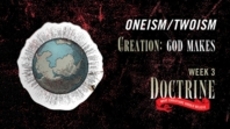
Oneism and Twoism
April 13, 2008
